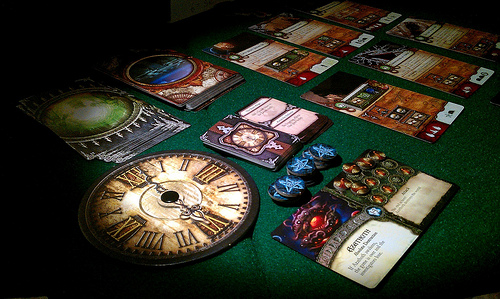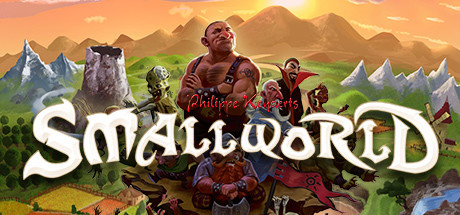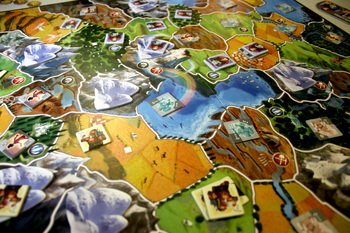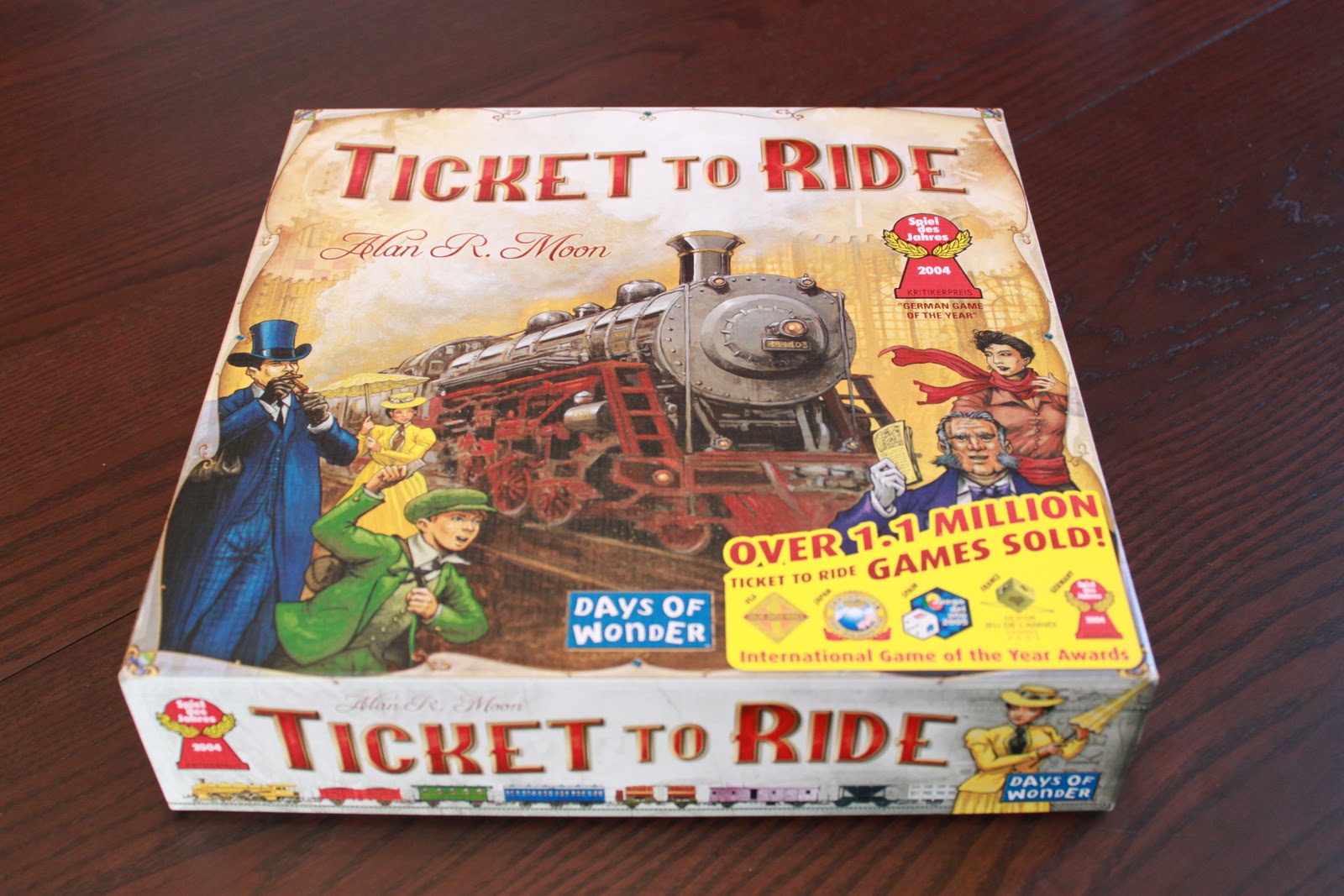Elder Sign is a medium, co-operative game. Set in the Cthulhu Mythos you and your fellow players are investigators trying to thwart the evil gods from descending on a museum filled with ancient mystical artifacts. Players take turns investigating areas of the museum and rolling dice to fulfill the requirements of that area, slowly warding evil and preventing the gods from awakening. Unfortunately this games theme is very light, as there is no board or pieces to speak of. The game boils down to fulfilling the dice rolls on each area and praying for the favor of the dice gods. The game is incredibly random, the rooms are randomly drawn, the evil god for each session is randomly chosen, rewards for successfully clearing areas are randomly drawn. You get the picture.
Elder Sign is a game entirely devoted to its lucked based mechanics. You'll have sessions, as I have, where you'll be tempted to swipe all the components off the table in frustration or where you're pumping your fists as you successfully move from room to room. The only solace you'll find is in your friends as you are all working together, each randomly chosen investigator brings something new to the table allowing for some slight strategy when it comes to choosing which rooms to investigate, but in the end it all comes down to dice rolls. I would recommend Elder Sign for people who like a difficult game and aren't frustrated by pure randomness. It's relatively inexpensive and gives you a taste of what heavier games have to offer without the crazy level of complexities and time investment.
--------------------------------------------------------------------------------------------------------------------------------------
King of Tokyo is a light, player elimination game. Each player chooses a giant monster inspired by classic films and B-movies and attempt to become the King of Tokyo. All of the monsters are the same and only differ aesthetically, an absolutely essential expansion changes this. The game boils down to a derivative of king of the hill. Players score points by occupying Tokyo but when in Tokyo they cannot heal and all monsters target them, on the same token when they attack they hit all monsters not in Tokyo. This brilliant risk/ reward is so beautifully balanced it propels the game into something really special. To do anything players must roll dice and take the results, be it health, attacks, points, or energy. First player to 20 points or last player standing wins.
Energy is accrued to purchase cards that reward you with special powers, an extra dice to roll, the ability to heal one point every turn, paralyze other monsters, etc. These are the final wrinkle in the game that add an enjoyable amount of crazy that prevent the game from feeling the same every time. The 100% essential expansion I mentioned earlier, dubbed Power Up!, adds even more variety by retroactively making each monster unique, evolving and acquiring new powers each time you play.
King of Tokyo is the perfect contrast to Elder Sign because like the aforementioned game King of Tokyo is entirely luck based, entirely dependent on the results of dice rolls. But the added press your luck element of choosing when to enter or leave Tokyo means the strategy, while simple, is key to winning. In stark comparison to Elder Sign where no amount of strategy can save you from continuously shitty dice rolls. I would recommend King of Tokyo to everyone, it's easy to pick up and play, and exudes a charm that makes the more aggressive player versus player actions you will do to each other less aggravating.
Sunday, March 8, 2015
Saturday, March 7, 2015
Board Game Briefs
Small World is a light, area-control game. At the start of the game players choose a pair of randomly assorted races and powers, each slightly different for added variety and replay ability. The different abilities effect the way you may play, either going for large land grabs or holding key positions. For example the Giants require one less soldier to conquer spaces adjacent to mountains and the wealthy power rewards you with 7 at the end of your first turn. With 14 races and 20 powers their are hundreds of possibilities. Throughout the game you'll vie for control of the most strategically advantageous spots on the board based on your chosen race and power while reaping the monetary benefits for doing so. The person with the most money at the end wins.
Small World is great for those who like a little more strategy in their lighthearted pursuit of world domination. There is enough complexity and variety among the different races and powers that it guarantees the games ability to stay fresh over multiple plays. You may figure out the general strategy of defending positions that net you great benefits but someone may have a race/ power combination that debunks that strategy forcing you to rethink your approach. With an average play time of around 60 Minutes, and easy to teach, simple rules that change only slightly depending on the race and power combinations you decide on, Small World is a great introductory area-control game and one I would highly recommend for just about anyone.
--------------------------------------------------------------------------------------------------------------------------------------
Tsuro is a light, tile laying, route networking game. In Tsuro you lay down tiles, each with different routes, down on the board and follow the path with your dragon, represented by a token. The theme is pretty light and abstract as the game is supposed to be about dueling dragons but it's reduced to simple tile laying. Each player is a dragon charting a it's route through the sky, players routes can intersect forcing dragons to collide or fly off the board if either occurs those players are eliminated. Last dragon standing is the winner.
Tsuro is what's called an 'opener', pretty self explanatory, but it's the game you play while deciding what game you'll play next or while having a drink or snacks. Tsuro takes no longer than 20 minutes and the more players the faster it goes as players quickly fill up the board and eliminate each other. Tsuro is an odd game to recommend on the one hand, it's light, short, with gorgeous components. On the other hand it doesn't lend itself to many plays. It retails for about $20 and you can get a more robust game that won't get old as fast.
When I introduced the game to my friends I was relieved at how quickly everybody picked it up. The game can seem daunting to casual players due to the numerous tokens and specific rules for each race and power but fundamentally the game is quite simple. I honestly thought, as is often the case, that the person with the most experience, i.e. me, would win. But in fact somebody else won, and won handily.
--------------------------------------------------------------------------------------------------------------------------------------
Tsuro is a light, tile laying, route networking game. In Tsuro you lay down tiles, each with different routes, down on the board and follow the path with your dragon, represented by a token. The theme is pretty light and abstract as the game is supposed to be about dueling dragons but it's reduced to simple tile laying. Each player is a dragon charting a it's route through the sky, players routes can intersect forcing dragons to collide or fly off the board if either occurs those players are eliminated. Last dragon standing is the winner.
Tsuro is what's called an 'opener', pretty self explanatory, but it's the game you play while deciding what game you'll play next or while having a drink or snacks. Tsuro takes no longer than 20 minutes and the more players the faster it goes as players quickly fill up the board and eliminate each other. Tsuro is an odd game to recommend on the one hand, it's light, short, with gorgeous components. On the other hand it doesn't lend itself to many plays. It retails for about $20 and you can get a more robust game that won't get old as fast.
Monday, March 2, 2015
An Overview of Board Games
Board Games are generally split into three major categories heavy, medium, and light 'weight' games with two minor categories medium-heavy and light-medium for more subtle categorization. These weight classes, which are oddly similar to boxing weight-classes, are determined by three major aspects, length, difficulty, and complexity. The longer, more difficult, or more complex a game is the higher along the weight track it settles. This is generally what you look at to determine, at a glance, if you and your gaming group will enjoy a game. Some groups like long games, others short and simple, and everything in-between.
After the general 'weight' of a game is determined then a games key mechanic, or game-play type, is defined to narrow down the game to a final pretty specific position. Some mechanics which I'll explain in more detail in future posts include, worker placement, area control, bluffing, etc. So for example a game like Ticket to Ride is firmly in the light weight category, taking roughly an hour to play, with very simple player actions and rules. It's three key mechanics include hand management due to objective cards, route networking represented by laying train carts along routes on the board and finally set collection as you try to collect certain numbers of specific colors of cards to lay those colored tracks. And that is how you classify a board game.
This brief overview will be useful as I talk about games and make references to some of the terms above while introducing and describing new ones. I'll end this post with a quick review of Ticket to Ride as template for how future posts will generally read.
After the general 'weight' of a game is determined then a games key mechanic, or game-play type, is defined to narrow down the game to a final pretty specific position. Some mechanics which I'll explain in more detail in future posts include, worker placement, area control, bluffing, etc. So for example a game like Ticket to Ride is firmly in the light weight category, taking roughly an hour to play, with very simple player actions and rules. It's three key mechanics include hand management due to objective cards, route networking represented by laying train carts along routes on the board and finally set collection as you try to collect certain numbers of specific colors of cards to lay those colored tracks. And that is how you classify a board game.
This brief overview will be useful as I talk about games and make references to some of the terms above while introducing and describing new ones. I'll end this post with a quick review of Ticket to Ride as template for how future posts will generally read.
Ticket to Ride
Ticket to Ride is one of the few things that could aptly be described as an instant classic, a term so overused it's a wonder anythings cultural impact is ever really determined, but Ticket to Ride earns the title as it firmly establishing an entirely new baseline for what games can and should be. For anyone whose experience with board games began and ended with games like Monopoly, Candy Land, Life, etc. Ticket to Ride is such an approachable, elegantly designed, and wonderfully enjoyable experience you'll curse the names of those so called 'classic' board games. Ticket to Ride is a perfect game to introduce to non-gamers and experienced gamers alike. Player Interactions are less confrontational and everyone's goals are slightly different so antagonism is kept to the minimum.
The game revolves around collecting different colored cards that allow you to lay tracks of the same color. You lay these tracks in conjunction with your destination cards that show you which cities on the map you need to connect. Connect all your destination cards and you can risk drawing more, a risk because if you do not complete them the score they would have afforded you will be deducted from your total. At the end you are scored for number tracks laid, longest continuous route, and most destination cards completed. And that's all there is to it, Ticket to Ride takes mere minutes to explain and is so quick to play and simple to understand I can't imagine someone having a bad experience as long as everyone is playing correctly.
The game revolves around collecting different colored cards that allow you to lay tracks of the same color. You lay these tracks in conjunction with your destination cards that show you which cities on the map you need to connect. Connect all your destination cards and you can risk drawing more, a risk because if you do not complete them the score they would have afforded you will be deducted from your total. At the end you are scored for number tracks laid, longest continuous route, and most destination cards completed. And that's all there is to it, Ticket to Ride takes mere minutes to explain and is so quick to play and simple to understand I can't imagine someone having a bad experience as long as everyone is playing correctly.
Subscribe to:
Posts (Atom)








